With the Atlanta Hawks’ remarkable upset of the Philadelphia 76ers on Sunday night, we have our final four teams left in the NBA Playoffs, and they are, it’s fair to say, not the traditional powerhouses. There is no LeBron, no Steph, no Durant, no Harden, no Embiid, no Jokic. Of the players with the top 12 selling jerseys in the NBA, only one, the Bucks’ Giannis Antetokounmpo, remains active. There is a very real possibility that the NBA Finals will involve a series of charter flights between Milwaukee and Phoenix.
The NBA’s financial structure is meant to give every team a chance, and yet the deck is still stacked toward the richest teams in the biggest markets. If you are a small-market team who drafts a superstar (say, a LeBron-in-Cleveland, or a Giannis-in-Milwaukee), that superstar has every incentive to stay with your team for at least the first half, and sometimes the prime, of his career. But the appeal of big cities and superteams is also undeniable; Los Angeles and Miami will always be Los Angeles and Miami, and two or three great players are more likely to congregate there. Any team, even yours, can end up with a franchise-altering star. But you have to do everything right to keep him. Cleveland and Toronto and San Antonio all won titles in the last decade … but Miami, Los Angeles and Golden State won more.
This year has been an anomaly, for a variety of reasons, most of which revolve around the truncated regular season and the spate of injuries to those same stars. The Lakers lost Anthony Davis (and had a compromised LeBron James); the Nets lost Kyrie Irving (and had a compromised James Harden); the Clippers, still hanging around, lost Kawhi Leonard. Those are five of the best 15 players in the league, on big-market teams with championship aspirations, all of whom were taken off the grid at the worst possible time. That’s a recipe for your title team to come from Atlanta, Milwaukee or Phoenix.
The notion that this is somehow a bad thing, though, is bizarre. Atlanta is in many ways the unofficial capital of the league, home of TNT’s beloved “Inside the NBA” show and considered by many to be America’s Black Mecca, and the Hawks are an exciting team led by a truly great NBA villain. Phoenix has the thrilling and perpetually underappreciated Devin Booker and, in what might end up being the central storyline of these playoffs, the best (and probably last) chance for Chris Paul to win a championship. And Milwaukee has Giannis, the two-time MVP and otherworldly athlete who has no real comparison throughout the history of the league. (Giannis is basically the best parts of about four different Hall of Famers. Unfortunately for him, none of them are Stephen Curry.) And even the Clippers, for all their big market bonafides, are as sad-sack a franchise as you will find in sports; the decades of devastation wrought by Donald Sterling still leave their mark. There are storylines everywhere.
If this were to happen every year, it’s fair to say the NBA wouldn’t love it, because it’s probably bad for ratings. Curry is the biggest TV draw in the league; LeBron is #2; nobody else is really close. The league loves its big market teams, and frankly, so do the rest of us: Even if we don’t like the Lakers or the Warriors, it’s just as much fun cheering against them. (Dynasties make terrific villains.)
It’s possible that the NBA Finals will have lower ratings this year if it’s Phoenix-Milwaukee, and bad-faith political actors will somehow try to blame that on LeBron James’ activism. But the idea that this should affect your life in any way, shape or form is bizarre. These are four exciting, vibrant teams, three of whom have never won the championship; and for the Bucks, it’s been 30 years since a title. It may be unusual to see these franchises playing on the biggest stage, and it may all well return to “normal” next year. But that’s a reason to enjoy what’s happening, and to appreciate it: We might not get another year like this for a long time. If ever.

